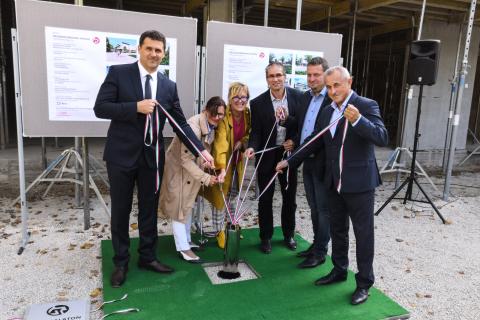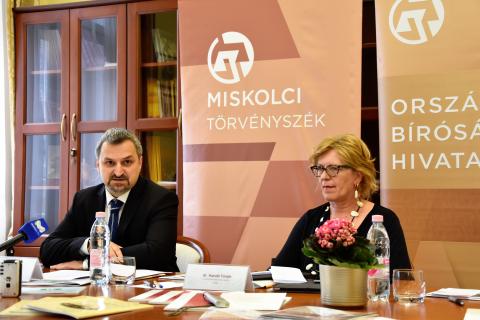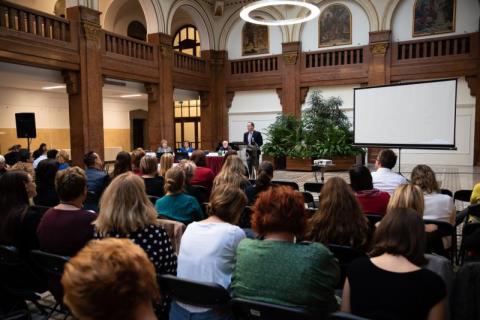Részletes keresés
The National Office for the Judiciary (NOJ) has invited entries for a contest for amateur photographers. Those who are interested in taking photos of court buildings, court work, everyday life or courtroom events are welcome to apply.
Nearly a hundred institutions and organisations participated in the children’s drawing contest „Images of Justice – Colours of Law and Court”, set out by 11 regional courts in cooperation with Zoom Association and the National Office for the Judiciary (NOJ).
The foundation stone of the new judicial training institution in Balatonszemes was solemnly placed. The „MIA-Balaton” can be completed by January 2021.
For decades, the Palace of Justice has been the seat of the highest judicial forum at the main square of the country. Adjacent to the Parliament building, the ministries and the Kúria, it also symbolizes the principle of separation of powers – said dr. Tünde Handó, the president of the National Office for the Judiciary (NOJ) when opening the international conference to commemorate the 150th anniversary of the proclamation of Act IV of 1869 on the Exercise of Judicial Power.
I have always kept the laws, I am ready for any inspection because it will only verify that I am performing my tasks with the moral decency it requires – claimed dr. Tünde Handó, President of the National Office for the Judiciary (NOJ) at the general meeting of judges reacting to the actions taken by the National Judicial Council (NJC). On Wednesday the NJC decided to turn to the Hungarian National Assembly to initiate the removal of the President of the NOJ from office.
The organizers of InfoSpace have brought together the most influential organizations, public institutions and business associations in the country to present their latest developments and future innovations for the tenth time this year.
Angol nyelven is elérhetők a bírói és a bírósági vezetői pályázatok elbírálásáról szóló tájékoztatók
Az Országos Bírósági Hivatal (OBH) elnöke, dr. Handó Tünde 2018-ban 284 bírói és 47 bírósági vezetői álláshelyre kiírt pályázat elbírálásában vett részt. Az OBH angolul is megjelentette az erről szóló tájékoztatókat.
The public vote on the works submitted for the photo contest "Courts in Focus” ended on Sunday. The nominees who receives the majority of the votes will be awarded a public prize. The voting has moved many, and it will soon turn out who has won over the audience the most, with just over two weeks to wait for the results to be announced.
We must maintain strength and unity, to maintain the trust of the people in our service, emphasized dr. Tünde Handó, the president of the National Office for the Judiciary in her solemn opening speech on the European Day of Civil Justice.
The importance of family relations, the alteration of the child’s habitual residence, the arrangements for visiting rights and child support obligations where the main topics at the National Conference on Child-Centered Justice, organized by the National Office for the Judiciary (NOJ) with the participation of one-hundred judges working in the field of family law and criminal law.
Applications from thirty-five court leaders have been assessed and evaluated by the National Office for the Judiciary (NOJ) until October 31st.
The substance of the national pieces of legislation may be limited by constraints originating from obligations under international and European Union law, however, the freedom and responsibility to develop a national court system continue to fall within a State’s exclusive competence – stressed in her welcome speech Dr. Tünde Handó, President of the National Office for the Judiciary at the international conference entitled “Sovereignty in the European Area of Justice”.
The Supreme Court of Hungary (Curia) keeps performing its judicial tasks laid down in the Constitution and other Acts at a high professional level during the epidemiological state of danger as well.
Development and preservation of a balanced judicial workload is a common task and shared interest in the judicial system, thus it is considered a high priority goal of the National Office for the Judiciary (NOJ).













